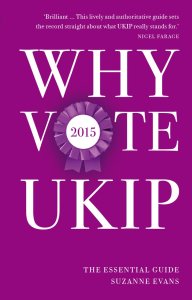Why vote UKIP? The Essential Guide by Suzanne Evans
Once again, Biteback is publishing a series of “Why vote…” books for the general election. I turned with particular interest to the UKIP one, given Nigel Farage’s public repudiation of much of his party’s 2010 manifesto – using words like “drivel” and “nonsense” before promising to start with a clear sheet of paper. What has his party been putting on that blank sheet of paper?
 However, Deputy Chairman Suzanne Evans rather skirts round this all, ending the book on a claim that her party is the one which has stood firm for decades without equivocation or volte-face. It’s as if Nigel Farage’s rubbishing of their previous set of policies hadn’t happened at all, though there are traces of it in the relative lack of detail in nearly all policy areas.
However, Deputy Chairman Suzanne Evans rather skirts round this all, ending the book on a claim that her party is the one which has stood firm for decades without equivocation or volte-face. It’s as if Nigel Farage’s rubbishing of their previous set of policies hadn’t happened at all, though there are traces of it in the relative lack of detail in nearly all policy areas.
On the NHS, for example, the policy is rather Gordon Brown like (not I think intentionally given what many UKIP members seem to think of the previous Labour Prime Minister) in that it is basically all about spending lots of extra money. The money would be found, Suzanne Evans argues, from getting out of Europe and from keep out more would-be immigrants.
Seeing big government spending as the answer to all problems for a public service is, however, restricted to the NHS. On other policy areas, it’s a much more standard right-wing, anti-state, anti-taxes, anti-overseas aid, anti-welfare (and yes, anti-Europe and anti-immigration) combination. There’s a strong dislike of anything that gets in the way of a business increasing its profits, save the occasional reference to workers’ rights (such as on zero hour contracts).
There is very little detail about costings leaving it hard for the reader to work out if this mix is plausible or profligate, though the party has promised a fully-costed general election manifesto in due course.
Two non-policy points also come out from the book. First a strident defence of the party against the negative perceptions many have of UKIP. Evans tells her own personal story, working with ethnic minority communities, being urged to join the party by a gay friend and “travel[ing] frequently in Europe”. Whether that last point sounds fair or sounds risible depends, I suspect, on your prior views of UKIP.
She also bemoans criticisms of the behaviour of some UKIP members, but slightly oddly rests her defence heavily on an example of one UKIP councillor’s extreme comments, pointing out that he made similar comments without attracting criticism when a Tory. Saying ‘don’t attack us, we’re just as bad as the other parties’ doesn’t really work as an argument under closer examination.
The other non-policy point that comes through clearly is a strong tinge of nostalgia for Britain as it was, with positive references to making more of the Commonwealth, brick bats thrown at multiculturalism and a firm defence made of the idea of Britain as a Christian country. The future UKIP want, if this book is a guide, is a restoration of the past.
Overall, it’s hard to see how the book will persuade those unsure about UKIP to back the party. Rather, it’ll rally existing supporters for who the book’s limitations don’t matter.
If you’re interested in UKIP, Nigel Farage’s autobiography, Flying Free, is well worth a look.
Got a view on this review? Then please rate it on Amazon.
Buy Why vote UKIP? The Essential Guide by Suzanne Evans here.
Note: a review copy of this book was provided to me by the publisher.
Leave a Reply